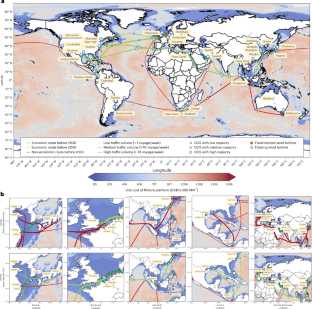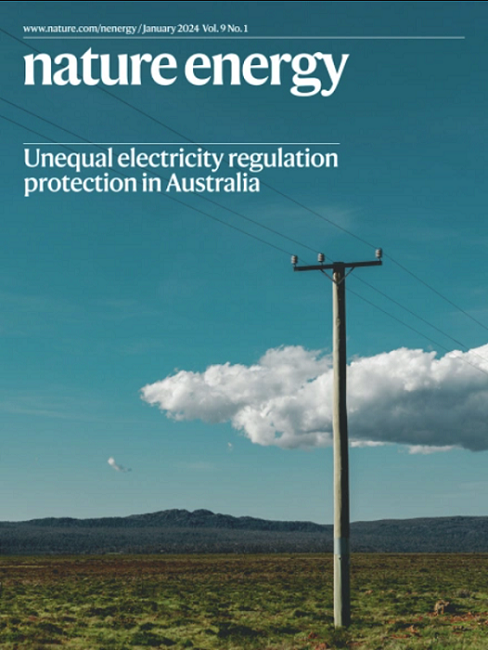Accelerating green shipping with spatially optimized offshore charging stations
IF 49.7
1区 材料科学
Q1 ENERGY & FUELS
引用次数: 0
Abstract
The decarbonization of marine transport is a global challenge due to the range and capacity limitations of renewable ships. Offshore charging stations have emerged as an innovative solution, despite increased investment and extended voyage durations. Here we develop a route-specific model for the optimal placement and sizing of offshore charging stations to assess their economic, environmental and operational impacts. Analysing 34 global and regional shipping routes, we find that offshore charging stations can reduce the cost for electric ships by US$0.3–1.6 (MW km)−1 and greenhouse gas emissions by 1.04–8.91 kg (MW km)−1 by 2050. The economic cruising range for 6,500 20-foot equivalent unit electric ships can increase from 3,000 km to 9,000 km. Voyage time costs for these enhancements vary between a 0% and 30% grace period of the original delivery time frame. We further investigate power-to-ammonia offshore refuelling stations as a proxy for e-fuels, which could potentially replace heavy fuel oil ships for routes over 9,000 km with only a 5% grace period. Offshore charging stations could be a promising solution to enhance green shipping. This research considers their optimal placement and sizing, extending the economic range of renewable ships to 9,000 km without compromising shipping efficiency.


推进海上充电站空间优化绿色航运
由于可再生船舶的航程和容量限制,海洋运输的脱碳是一项全球性挑战。尽管投资增加,航行时间延长,但海上充电站已经成为一种创新的解决方案。在这里,我们为海上充电站的最佳布局和规模开发了一个特定路线的模型,以评估其经济、环境和运营影响。通过对34条全球和区域航线的分析,我们发现,到2050年,海上充电站可以使电动船舶的成本降低0.3-1.6美元(MW km)−1,温室气体排放量减少1.04-8.91 kg (MW km)−1。6500艘20英尺当量单位电动船的经济巡航范围可以从3000公里增加到9000公里。这些改进的航程时间成本在原始交付时间框架的0%到30%的宽限期之间变化。我们进一步研究了电力制氨海上加气站作为电子燃料的代表,它有可能取代重油船,航程超过9000公里,只有5%的宽限期。
本文章由计算机程序翻译,如有差异,请以英文原文为准。
求助全文
约1分钟内获得全文
求助全文
来源期刊

Nature Energy
Energy-Energy Engineering and Power Technology
CiteScore
75.10
自引率
1.10%
发文量
193
期刊介绍:
Nature Energy is a monthly, online-only journal committed to showcasing the most impactful research on energy, covering everything from its generation and distribution to the societal implications of energy technologies and policies.
With a focus on exploring all facets of the ongoing energy discourse, Nature Energy delves into topics such as energy generation, storage, distribution, management, and the societal impacts of energy technologies and policies. Emphasizing studies that push the boundaries of knowledge and contribute to the development of next-generation solutions, the journal serves as a platform for the exchange of ideas among stakeholders at the forefront of the energy sector.
Maintaining the hallmark standards of the Nature brand, Nature Energy boasts a dedicated team of professional editors, a rigorous peer-review process, meticulous copy-editing and production, rapid publication times, and editorial independence.
In addition to original research articles, Nature Energy also publishes a range of content types, including Comments, Perspectives, Reviews, News & Views, Features, and Correspondence, covering a diverse array of disciplines relevant to the field of energy.
 求助内容:
求助内容: 应助结果提醒方式:
应助结果提醒方式:


